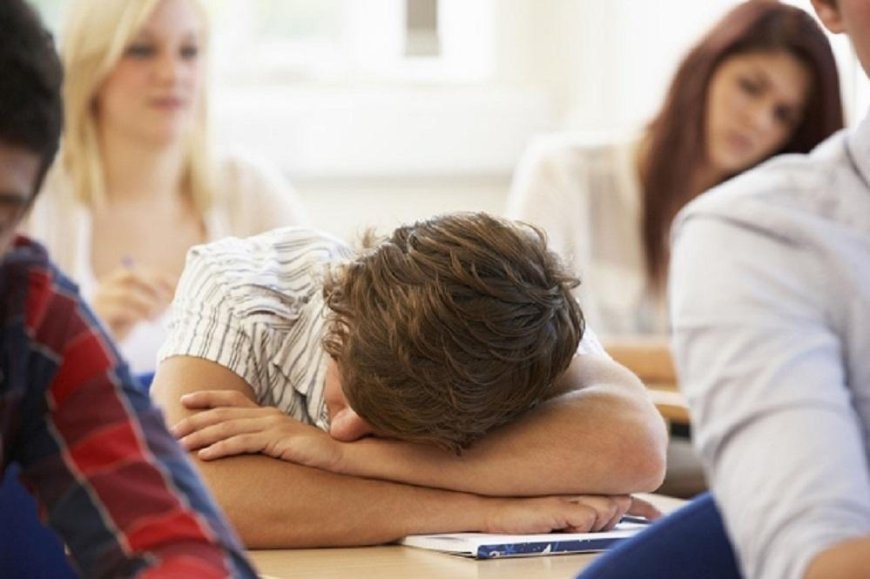Sleep problems in teens - learn more about it!
may have trouble sleeping. Is this the case for your child? Here's what you need to know about sleep problems in teens.

Sleep problems in teenagers
Many teenagers do not get enough sleep and may have trouble sleeping. Is this the case for your child? Here's what you need to know about sleep problems in teenagers.
Sleep problems in teens is becoming more and more common in our society these days. What are the most common disorders associated with it? What are their consequences? How can they be prevented or avoided? Below we will analyze this topic and answer common questions.
But before we discuss it, we must note that in general, teens need about 9 to 10 hours of sleep a day to be healthy and balanced. Otherwise, their daytime function could be severely impaired. And this can lead to many negative consequences, both physical and psychological.
Therefore, controlling your teenager's sleep is not a trivial matter. Rather, an aspect that needs to be taken care of and its vital importance taken into account.
Sleep problems in adolescents
- Chronic sleep deprivation. It is a build-up of a sleep deficit caused by not getting enough sleep throughout the week.
- Difficulty falling asleep and staying asleep. Often times, doctors observe a lack of restorative sleep, early awakening, or intermittent sleep.
- There is excessive daytime sleepiness and sudden attacks of sleepiness. It is usually accompanied by cataplexy, sleep paralysis, and hypnagogic hallucinations (auditory or visual hallucinations), and hypnopompic hallucinations (occurring between sleep and wake).
- Idiopathic hypersomnia. This phenomenon is similar to the previous sleep problem we discussed. Here, too, there is excessive daytime sleepiness, despite having enough sleep. But there are no other symptoms that are characteristic of narcolepsy.
- Restless legs syndrome and periodic limb movements. This phenomenon consists in experiencing an unpleasant and unpleasant sensation in the legs while sleeping, resulting in an uncontrolled need to move the limbs frequently.
- These are behavioral disturbances that occur during sleep, such as night terrors, sleepwalking, confusing awakenings, sleep paralysis.
If you suspect any of these sleep problems in your teen, it's important to see a healthcare professional right away. He or she will be responsible for ensuring that appropriate treatment is provided in each case.
Consequences that can cause sleep problems in adolescents
Adolescents who suffer from sleep deprivation or a lack of sleep due to some of the problems we have discussed may experience a number of consequences. Usually, they directly affect the proper functioning of the mind and body. Some of the most common are:
- Daytime sleepiness.
- Constant fatigue.
- Irritability and tension.
- Increased likelihood of developing mood disorders.
- Poor academic performance.
- Sudden behavioral changes.
- Memory loss.
- Poor concentration or inability to pay attention.
- Social problems.
- Increased risk of overuse of stimulants such as coffee and energy drinks.
Recommendations for ensuring good sleep hygiene
To prevent sleep problems from worsening in adolescence, or simply from occurring, it is important for young people to maintain proper sleep hygiene by following these tips:
Must Read: Find out what benefits children libraries can offer!
- Avoiding intense physical exercise in the last hours before going to bed.
- A regular schedule for getting up and going to bed.
- No hearty and late dinners.
- Avoid drinking coffee, tea, alcohol, energy drinks, or cola drinks before going to bed.
- Sleeping in a well-ventilated room with a pleasant temperature.
- Relaxing activities before going to bed, such as reading, listening to music, meditating ...
- Only use the bed for sleeping.
- Avoiding playing video games, not watching TV, or excessively using your computer, mobile phone, or tablet before going to bed or in the early evening hours.
Conclusion
However, parents know perfectly well that trying to change teenagers' sleep habits can be a challenge. Therefore, it is best that these measures are implemented from the first years of life so that your child gets used to following certain sleep hygiene guidelines from an early age.
And when he reaches adolescence, make them part of his daily routine.
